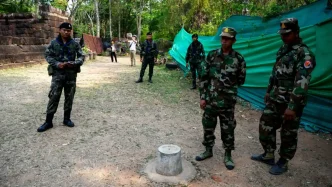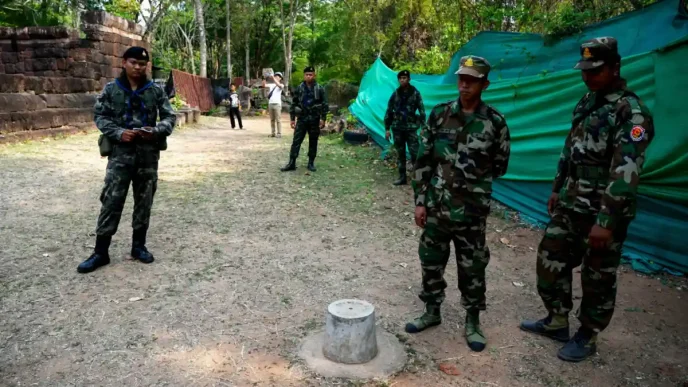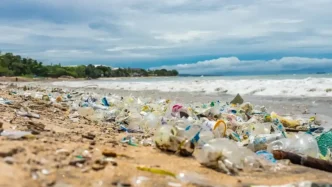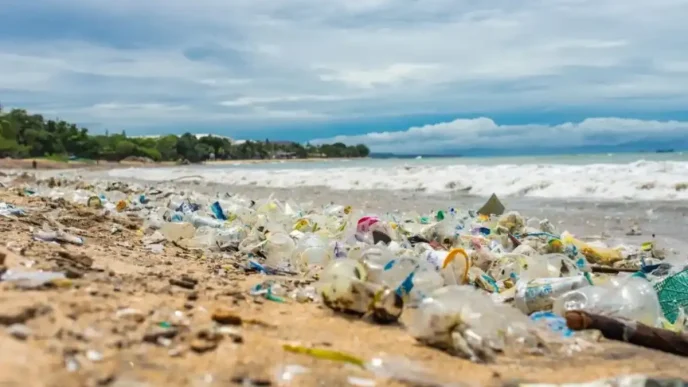In a powerful display of solidarity between two Muslim-majority nations, Turkish President Recep Tayyip Erdogan and Malaysian Prime Minister Anwar Ibrahim have pledged joint efforts to support the reconstruction of war-torn Gaza, while simultaneously strengthening bilateral ties during Erdogan’s landmark two-day visit to Malaysia. The visit, marking Erdogan’s first official trip to the country under Anwar’s leadership, underscored shared commitments to humanitarian causes and mutual economic ambitions, set against the backdrop of a fragile ceasefire in Gaza and escalating geopolitical tensions.
The leaders’ discussions in Putrajaya on 11 February centred on the plight of Palestinians, with both nations vowing to bolster humanitarian aid and reconstruction efforts in Gaza, a territory devastated by years of conflict. Anwar revealed Malaysia’s support for a Japanese-led initiative to establish a fund for Gaza’s reconstruction, noting that Tokyo had invited Kuala Lumpur to co-chair the East Asia Reconstruction Plan for Gaza and Palestine. While specifics of the fund remain under wraps, the commitment signals a broader international push to address the humanitarian crisis.
Erdogan, meanwhile, highlighted Turkey’s extensive aid efforts, stating that over 100 ships have delivered essential supplies to Palestinians in Gaza. He praised Malaysia’s stance on the issue, describing Gaza and Palestine as shared priorities for both nations. The Turkish leader also called for Israel to honour the terms of a recently brokered ceasefire agreement—reached in January 2025 just before the start of US President Donald Trump’s second term—and reiterated his long-standing advocacy for a Palestinian state with East Jerusalem as its capital.
Gaza: A Shared Humanitarian Priority
The focus on Gaza comes at a critical juncture. The conflict, reignited by a Hamas-led attack on Israel on 7 October 2023, which killed around 1,200 people and saw over 250 hostages taken, has left the territory in ruins. The January 2025 ceasefire aimed to halt hostilities and facilitate aid delivery, but recent developments have raised concerns about its durability. On 10 February, Hamas announced it would pause the release of Israeli hostages, citing alleged violations of the ceasefire by Israel. In response, Israel has instructed its military to prepare for “any possible scenario” in Gaza, casting a shadow over prospects for lasting peace.
Both Anwar and Erdogan have been vocal critics of Israel’s policies, with the Turkish president describing the occupation of Gaza as the “core problem” during a joint press conference. Erdogan also proposed that Israel should bear an estimated US$100 billion (£77 billion) of the rebuilding costs for Gaza—a figure he cited during a public lecture in Putrajaya on 10 February. This call for accountability reflects a broader narrative among some Muslim-majority nations that Israel must take responsibility for the destruction caused by decades of conflict, particularly since the displacement of Palestinians in 1948.
Adding to the complexity, a controversial proposal by US President Trump on 5 February to “take over” the Gaza Strip, resettle around two million Palestinians elsewhere, and transform the area into “the Riviera of the Middle East” has drawn sharp condemnation from the Islamic world and major European countries. While neither Anwar nor Erdogan directly addressed Trump’s plan during their public statements, their unified stance on Gaza’s reconstruction serves as an implicit rebuke of such unilateral approaches, prioritising Palestinian self-determination over external imposition.
Beyond Gaza: A Personal and Political Bond
The meeting between Erdogan and Anwar was not just about geopolitics; it was deeply personal. The two leaders share a history of political struggle, having both endured imprisonment before rising to the highest offices in their respective countries. Anwar, who was jailed for eight years on two separate sodomy charges before becoming Malaysia’s prime minister in November 2022, referred to Erdogan as “brother” during their interactions. He also expressed gratitude for the support provided by Erdogan and his wife, Emine, during a particularly harrowing period in 2008 when Anwar sought refuge at the Turkish Embassy in Kuala Lumpur amid sodomy allegations.
Erdogan, for his part, served four months in jail in 1999 for inciting racial hatred before becoming Turkey’s prime minister in 2003 and later president in 2014. Anwar drew parallels between their journeys, describing both as having risen “from imprisonment to the highest office in the land.” This shared experience of resilience was echoed by Maszlee Malik, chairman of the International Institute of Advanced Islamic Studies Malaysia, who told local media that the leaders symbolise “the perseverance of struggle towards justice and democratic accountability.”
This personal rapport was further highlighted by symbolic gestures during the visit. Upon Erdogan’s arrival on 10 February, Anwar personally received him—a rare honour typically reserved for a designated minister. Additionally, Erdogan gifted Anwar a Turkish-made Togg T10X electric vehicle, a white sport utility vehicle in which the Malaysian leader drove his Turkish counterpart to the press conference. The gesture was framed as a token of solidarity and friendship between the two nations.
Economic and Defence Ties Take Centre Stage
Beyond the humanitarian and personal dimensions, the visit yielded significant outcomes for Turkey-Malaysia relations. The leaders pledged to double bilateral trade from US$5.28 billion in 2024 to US$10 billion, though no specific timeline was provided. This ambition reflects a mutual desire to deepen economic cooperation, building on existing partnerships.
Defence and security cooperation also received a boost, with the exchange of 11 memorandums of understanding and agreements. A key highlight was Malaysia’s procurement of a multi-purpose mission ship for the Malaysian Maritime Enforcement Agency from Istanbul-based Desan Shipyard. This follows Malaysia’s acquisition of three littoral mission ships from Turkish defence company Savunma Teknolojileri Muhendislik in June 2024, aimed at countering China’s maritime encroachments in Malaysian waters—a persistent concern for Kuala Lumpur amid tensions in the South China Sea.
Anwar also acknowledged Turkey’s trust in Malaysia Airports Holdings, which manages Istanbul’s Sabiha Gokcen International Airport, Turkey’s largest city. This partnership underscores the growing economic interdependence between the two nations, spanning infrastructure, defence, and beyond.
A Vision for a Multipolar World
The collaboration on Gaza and the strengthening of bilateral ties carry broader implications for the global order. Maszlee Malik framed the partnership as the beginning of a “new multicultural and multipolar world civilisation,” challenging what he described as the current “unipolar Western-hegemonic civilisation.” While such rhetoric may resonate with domestic audiences in both countries, it also reflects a growing assertiveness among middle powers like Malaysia and Turkey to carve out independent roles on the world stage, particularly on issues of justice and humanitarian concern.
However, the path forward is fraught with challenges. The situation in Gaza remains volatile, with the ceasefire hanging by a thread amid mutual accusations of violations. The speculative nature of rebuilding cost estimates—such as Erdogan’s US$100 billion figure—must be treated with caution, as no independent assessments have confirmed these numbers. Similarly, the Japanese-led fund for Gaza’s reconstruction lacks concrete details, raising questions about its feasibility and scope. If confirmed, such initiatives could mark a turning point for Gaza’s recovery; if not, they risk becoming symbolic gestures overshadowed by ongoing conflict.
Balancing Solidarity with Pragmatism
For Malaysia, aligning with Turkey on Gaza and deepening bilateral ties serves multiple purposes. It reinforces Anwar’s credentials as a leader committed to the Muslim world’s causes, a stance that plays well domestically. At the same time, economic and defence agreements with Turkey bolster Malaysia’s strategic position, particularly in the context of regional security concerns like the South China Sea disputes. Yet, Kuala Lumpur must navigate these partnerships carefully, balancing ideological solidarity with pragmatic foreign policy to avoid alienating other international actors.
Turkey, under Erdogan’s leadership, continues to position itself as a champion of Palestinian rights and a key player in the Islamic world. The visit to Malaysia—a nation with its own aspirations for regional influence—underscores Ankara’s strategy of building alliances beyond its immediate neighbourhood. However, Turkey’s assertive rhetoric on Gaza, including calls for Israel to fund reconstruction, may complicate its relations with Western powers already critical of its foreign policy.
A Partnership with Global Echoes
The meeting between Erdogan and Anwar in Putrajaya was more than a bilateral engagement; it was a statement of intent. By uniting on Gaza’s reconstruction, doubling down on economic ties, and celebrating a shared history of political struggle, Turkey and Malaysia are crafting a narrative of solidarity that resonates far beyond their borders. Yet, the fragility of the Gaza ceasefire, the speculative nature of rebuilding plans, and the broader geopolitical currents—exemplified by Trump’s controversial Gaza proposal—remind us that such ambitions are not without risk.
For now, the image of two leaders, bonded by personal and political journeys, driving together in a Turkish electric vehicle offers a potent symbol of unity. Whether this unity translates into tangible outcomes for Gaza, or for Turkey-Malaysia relations, remains to be seen. What is clear is that both nations are determined to play a role in shaping a future where their voices—and those of the communities they champion—are heard on the global stage.














